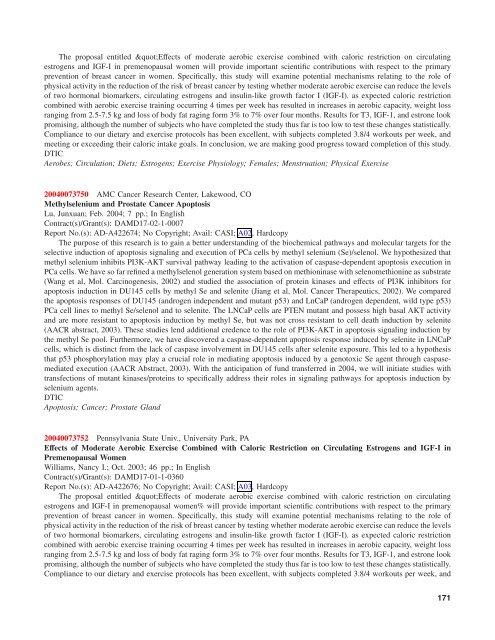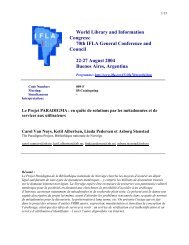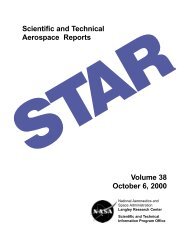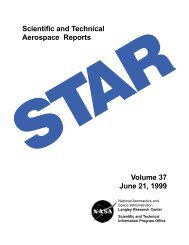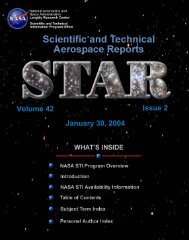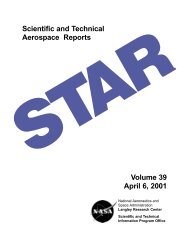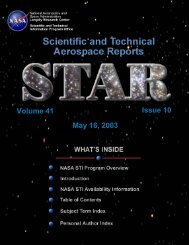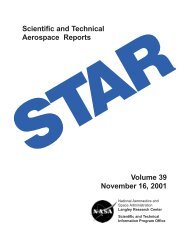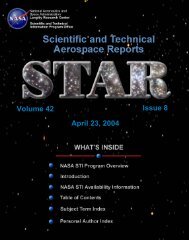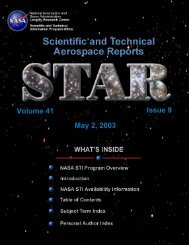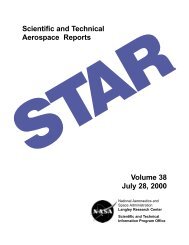- Page 2 and 3:
NASA STI Program ... in Profile Sin
- Page 4 and 5:
NASA STI Availability Information N
- Page 6 and 7:
Geosciences 43 Earth Resources and
- Page 8 and 9:
SCIENTIFIC AND TECHNICAL AEROSPACE
- Page 10 and 11:
iced airfoils. The software was app
- Page 12 and 13:
concerning the operation of aircraf
- Page 14 and 15:
nitrides. There are over 60 of thes
- Page 16 and 17:
With the increasing use of fiber-re
- Page 18 and 19:
20040071101 Texas Univ., Austin, TX
- Page 20 and 21:
20040073643 Naval Research Lab., St
- Page 22 and 23:
20040074155 Air Force Inst. of Tech
- Page 24 and 25:
instrumentation is needed to improv
- Page 26 and 27:
Perched atop a Long March (CZ-2F) l
- Page 28 and 29:
to analyze model with the dense mes
- Page 30 and 31:
network. To achieve these goals, a
- Page 32 and 33:
The space radiation environment can
- Page 34 and 35:
20040074322 NASA Langley Research C
- Page 36 and 37:
experience gained from the morning
- Page 38 and 39:
20040070749 Eagle-Picher Industries
- Page 40 and 41:
(IPD) program, and the Hybrid Sound
- Page 42 and 43:
eactions (with group balance when p
- Page 44 and 45:
ehavior and the resulting damage me
- Page 46 and 47:
single-walled carbon nanotubes (SWN
- Page 48 and 49:
As part of an ongoing effort to dev
- Page 50 and 51:
A critical analysis of the CCSD(T)
- Page 52 and 53:
zone permeability. Two full-scale P
- Page 54 and 55:
changes can have drastic affects. N
- Page 56 and 57:
needed for validation of a detailed
- Page 58 and 59:
20040073730 Stanford Univ., Stanfor
- Page 60 and 61:
20040073775 Army Cold Regions Resea
- Page 62 and 63:
Prior studies of Alloy 600 and Allo
- Page 64 and 65:
20040070763 NASA Langley Research C
- Page 66 and 67:
esearch. The Lorentz force induced
- Page 68 and 69:
ship’s hull, to generate pitch mo
- Page 70 and 71:
20040073644 Stevens Inst. of Tech.,
- Page 72 and 73:
28 PROPELLANTS AND FUELS Includes r
- Page 74 and 75:
Biological and Physical Space Resea
- Page 76 and 77:
20040071043 NASA Langley Research C
- Page 78 and 79:
20040068297 National Telecommunicat
- Page 80 and 81:
The Navy-Marine Corps team envision
- Page 82 and 83:
y applying the doctrine of maneuver
- Page 84 and 85:
solutions. Single and multi-stage p
- Page 86 and 87:
of the NMOS transistors with an n-c
- Page 88 and 89:
20040070924 NASA Marshall Space Fli
- Page 90 and 91:
20040073555 State Univ. of New York
- Page 92 and 93:
qubits in quantum computers. It has
- Page 94 and 95:
20040068170 NASA Ames Research Cent
- Page 96 and 97:
different flow types are proposed.
- Page 98 and 99:
20040070802 QSS Group, Inc., Clevel
- Page 100 and 101:
experimental dataset provides essen
- Page 102 and 103:
This final report describes the pro
- Page 104 and 105:
vapor line and liquid line are made
- Page 106 and 107:
A general model is presented that a
- Page 108 and 109:
detectors or highly cooled (about 4
- Page 110 and 111:
Architecture with Uncooled TIR Dete
- Page 112 and 113:
potential for inducing catastrophic
- Page 114 and 115:
discuss the technical issues involv
- Page 116 and 117:
20040073759 Michigan Technological
- Page 118 and 119:
solution. The sensor responds prope
- Page 120 and 121:
noise. Multiplexers for large numbe
- Page 122 and 123:
20040074303 Cologne Univ., Germany
- Page 124 and 125:
20040073556 Florida State Univ., Ta
- Page 126 and 127:
otor and blades, were found to be i
- Page 128 and 129: local wave-form changes associated
- Page 130 and 131: limited number of geometries. The r
- Page 132 and 133: 20040071005 NASA Marshall Space Fli
- Page 134 and 135: Commercial Instrument Validation La
- Page 136 and 137: 20040071082 Lockheed Martin Space O
- Page 138 and 139: esolution specifications for new se
- Page 140 and 141: and resistance of the cell has rema
- Page 142 and 143: 20040070745 ElectroChem, Inc., Wobu
- Page 144 and 145: cell potential vs. current density
- Page 146 and 147: 20040070987 Lawrence Livermore Nati
- Page 148 and 149: in the Earth’s climate system. Th
- Page 150 and 151: the scientific questions of the rol
- Page 152 and 153: 20040073763 Georgia Tech Research I
- Page 154 and 155: frontal systems approaching the Nam
- Page 156 and 157: effects of climate change and urban
- Page 158 and 159: forecasting weather in the vast, da
- Page 160 and 161: that 100 tg of dust are transported
- Page 162 and 163: effort to study the monsoons. The o
- Page 164 and 165: looking at data files generated by
- Page 166 and 167: Body weights of rat pups reared dur
- Page 168 and 169: maltose, sucrose, starch and D-mann
- Page 170 and 171: changes in SFOAEs due to noise can
- Page 172 and 173: 20040073582 Scripps Research Inst.,
- Page 174 and 175: stratified random sample of 9,975 f
- Page 176 and 177: The financial challenges associated
- Page 180 and 181: educe the acidosis that forms with
- Page 182 and 183: Our hypothesis has been that four e
- Page 184 and 185: health risks. Recent work in a vari
- Page 186 and 187: 20040073543 National Center of Hygi
- Page 188 and 189: the movement, without the effects o
- Page 190 and 191: incremental refinement of imagery w
- Page 192 and 193: noise level that the process noise
- Page 194 and 195: In this paper, we develop a time an
- Page 196 and 197: variety of applications while facil
- Page 198 and 199: 20040070714 NASA Ames Research Cent
- Page 200 and 201: 20040070937 NASA Langley Research C
- Page 202 and 203: Simulation (NPSS) software package.
- Page 204 and 205: and Total Aircraft Tons, The result
- Page 206 and 207: independent of communications bandw
- Page 208 and 209: 20040073701 Air Force Inst. of Tech
- Page 210 and 211: capable tool with extensibility to
- Page 212 and 213: their work became extraordinarily t
- Page 214 and 215: 20040074124 Naval Postgraduate Scho
- Page 216 and 217: levels of autonomous operation and
- Page 218 and 219: capabilities in a number of diverse
- Page 220 and 221: This report documents the mechanica
- Page 222 and 223: 20040068141 NASA Ames Research Cent
- Page 224 and 225: produced by SRTM. In particular, we
- Page 226 and 227: 20040073588 Forschungsinstitut fuer
- Page 228 and 229:
20040073595 Johns Hopkins Univ., La
- Page 230 and 231:
little from one frequency to the ne
- Page 232 and 233:
20040073610 Army Research Lab., Abe
- Page 234 and 235:
and dynamic errors. The Technical R
- Page 236 and 237:
partners, they tend to be involved
- Page 238 and 239:
20040073805 Naval Postgraduate Scho
- Page 240 and 241:
will be available for experiments i
- Page 242 and 243:
with other subsystems. Currents on
- Page 244 and 245:
20040070994 Lawrence Livermore Nati
- Page 246 and 247:
20040071060 Brookhaven National Lab
- Page 248 and 249:
20040073464 NASA Langley Research C
- Page 250 and 251:
tension. The binder material with m
- Page 252 and 253:
and high Earth orbit missions. 3. I
- Page 254 and 255:
20040073472 Taitech, Inc., Beavercr
- Page 256 and 257:
to be contaminated by errors caused
- Page 258 and 259:
uses a gold-black coating for optic
- Page 260 and 261:
water-leaving radiances will suppor
- Page 262 and 263:
We discuss the temporal and spectra
- Page 264 and 265:
induced transparency (EIT) in GaAs
- Page 266 and 267:
ecently completed a TPF Mission Arc
- Page 268 and 269:
International Thermal Detectors Wor
- Page 270 and 271:
calculated x-ray fluxes from the pr
- Page 272 and 273:
substantial groundwork with aluminu
- Page 274 and 275:
1979, when we decided it was time t
- Page 276 and 277:
in our competitive position resulti
- Page 278 and 279:
also work to foster increased trust
- Page 280 and 281:
of interacting with others while wo
- Page 282 and 283:
20040070865 Ford Motor Co., Dearbor
- Page 284 and 285:
and industry in the nation’s aero
- Page 286 and 287:
20040068173 NASA Langley Research C
- Page 288 and 289:
20040073532 Defense Manpower Data C
- Page 290 and 291:
it was found that information flow
- Page 292 and 293:
provided for consideration in the s
- Page 294 and 295:
This viewgraph presentation provide
- Page 296 and 297:
applications are re-factored into t
- Page 298 and 299:
where its calibration is maintained
- Page 300 and 301:
status of the development of SOFIA
- Page 302 and 303:
separation roughly constant. The li
- Page 304 and 305:
esonances involving the longitude o
- Page 306 and 307:
15-17, 2003 and hosted by the Insti
- Page 308 and 309:
scientific enthusiasm amongst Europ
- Page 310 and 311:
Bolocam, MAMBO) and the surveys of
- Page 312 and 313:
20040074293 Naval Research Lab., Wa
- Page 314 and 315:
The questions of greatest scientifi
- Page 316 and 317:
walls and more. I will also list wh
- Page 318 and 319:
al., which suggest considerable bla
- Page 320 and 321:
as is often invoked for black hole
- Page 322 and 323:
We report on the timing analysis of
- Page 324 and 325:
Space Flight Center, Greenbelt, MD,
- Page 326 and 327:
20040073754 Air Force Research Lab.
- Page 328 and 329:
A possible accretion model associat
- Page 330 and 331:
spectrally resolved application, la
- Page 332 and 333:
composition with unprecedented wave
- Page 334 and 335:
20040073504 NASA Marshall Space Fli
- Page 336 and 337:
20040068206 L-1 Standards and Techn
- Page 338 and 339:
individual flares. In addition, RHE
- Page 340 and 341:
93 SPACE RADIATION Includes cosmic
- Page 342 and 343:
perigee observations from 1 Decembe
- Page 344 and 345:
ABBREVIATIONS MSFC Space Station Pr
- Page 346 and 347:
AEROSPACE VEHICLES Application of S
- Page 348 and 349:
ANNOTATIONS An Annotated Bibliograp
- Page 350 and 351:
AUTOMATIC CONTROL Automated Modern
- Page 352 and 353:
BLOOD PRESSURE Flow Redistribution
- Page 354 and 355:
CATALOGS (PUBLICATIONS) The BATSE E
- Page 356 and 357:
COMBAT An Improvement to Situationa
- Page 358 and 359:
Speech Recognition Software; An Alt
- Page 360 and 361:
Proceedings of the Autonomous Vehic
- Page 362 and 363:
Effects of Fatigue on Simulation-Ba
- Page 364 and 365:
DOPPLER RADAR Interference Estimati
- Page 366 and 367:
ELECTROMAGNETIC WAVE TRANSMIS- SION
- Page 368 and 369:
EUROPE Future Far-IR Mission and Su
- Page 370 and 371:
Application of Non-Deterministic Me
- Page 372 and 373:
GALACTIC RADIATION A New Method to
- Page 374 and 375:
GUIDANCE SENSORS Advanced Video Gui
- Page 376 and 377:
HVOF THERMAL SPRAYING Replacement o
- Page 378 and 379:
INDUSTRIES The 10-Year Remote Sensi
- Page 380 and 381:
ION BEAMS Understanding Particle De
- Page 382 and 383:
LEVITATION An Overview of the Mater
- Page 384 and 385:
MAMMALS Coordinate Expression of th
- Page 386 and 387:
Structural Fluctuation and Thermoph
- Page 388 and 389:
MINERALOGY Perovskite Manganites: A
- Page 390 and 391:
NEBULAE IR Fine-Structure Line Sign
- Page 392 and 393:
OPTICAL MEASUREMENT Development of
- Page 394 and 395:
PHYSIOLOGICAL EFFECTS Characterizat
- Page 396 and 397:
PROCUREMENT Metrics to Monitor Gove
- Page 398 and 399:
RADAR CROSS SECTIONS Bandwidth Limi
- Page 400 and 401:
Automated Rendezvous and Capture Sy
- Page 402 and 403:
SEALING Strain-Life Assessment of G
- Page 404 and 405:
SMOG Brown Cloud Pollution and Smog
- Page 406 and 407:
SPACE TRANSPORTATION SYSTEM FLIGHTS
- Page 408 and 409:
STRESS CONCENTRATION Development of
- Page 410 and 411:
TANTALUM Densification of nanocryst
- Page 412 and 413:
Energy Release Rate in a Constraine
- Page 414 and 415:
TWO DIMENSIONAL MODELS An Investiga
- Page 416 and 417:
Properties of Longitudinal Flux Tub
- Page 418 and 419:
Abbas, M. M. Laboratory Experiments
- Page 420 and 421:
Auyeung, T. P. Design of a High Hea
- Page 422 and 423:
Bey, Kim S. A Discontinuous Galerki
- Page 424 and 425:
Brown, T. Individual Radiation Prot
- Page 426 and 427:
Chen, Yuan A Chip and Pixel Qualifi
- Page 428 and 429:
Crochetiere, William J. On the Use
- Page 430 and 431:
Dunn, J. Spectral and Imaging Chara
- Page 432 and 433:
Fournet, R. Chemical Kinetic Charac
- Page 434 and 435:
Giulianetti, Demo J. Aviation Syste
- Page 436 and 437:
Harris, Robert Comparing Methods fo
- Page 438 and 439:
Hua, Inez Environment Partitioning
- Page 440 and 441:
Khairoutdinov, M. Cloud-Resolving M
- Page 442 and 443:
LaConti, A. Some Recent Studies Wit
- Page 444 and 445:
Little, James E. Fuel-Flexible Gas
- Page 446 and 447:
Marsic, Damien Spirochaeta American
- Page 448 and 449:
Montgomery, Edward E, IV The Develo
- Page 450 and 451:
Nitao, E. N. Parameterization of In
- Page 452 and 453:
Phan, Kandy Q. Design and Implement
- Page 454 and 455:
Ren, Libo Dynamic Punch Shear Behav
- Page 456 and 457:
Schatz, Josh The Use of LS-DYNA in
- Page 458 and 459:
Sokolov, Sergey Assembly of Functio
- Page 460 and 461:
Talley, D. G. The Development of a
- Page 462 and 463:
Varakala, S. Facilitating Intellige
- Page 464 and 465:
Whipple, Kelin X. Relief Evolution
- Page 466 and 467:
Yen, Chian-Fong Dynamic Punch Shear


